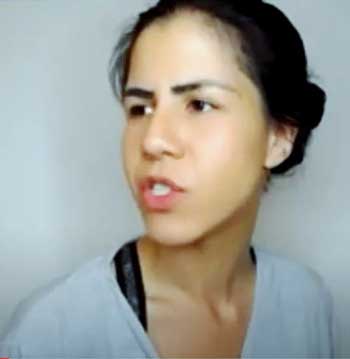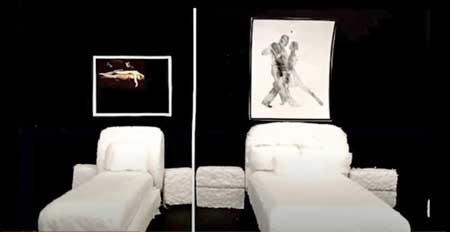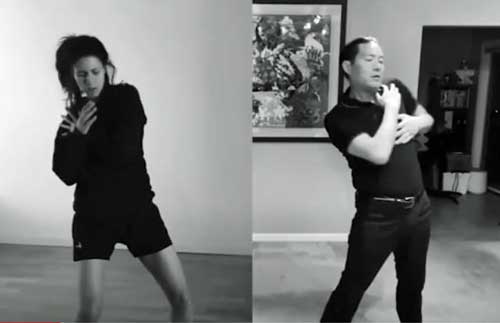Thanks to “An ME Patient” for her review of “A Demon on My Life”

Leigh Fitzjames provided a remarkable portrayal of Liz – a strong minded, independent young woman with ME/CFS.
“A Demon on my Life” is a play about a couple grappling with the effects of the wife’s ME. Written and directed by JB Bruno, it premiered on June 20th, with an encore performance on June 22nd.
It was presented live online, via Zoom, with plans for theater performances in New York, plus livestreaming to select ME audiences unable to attend in person.
Cort Johnson announced it in an article on Health Rising, describing Bruno’s explanation for how the idea came about. It is now available on YouTube (see below).
I’d never seen a drama about an ME patient before. I haven’t read any fiction about one either. Only the emphatically non-fiction world of medical conferences and science articles, with a few documentaries. Before watching it, I was somewhat skeptical about what it might be like. How to portray, in an interesting and watchable way, a sick person who spends most of their time lying down, unable to leave their house? And to put it on live, via Zoom? And yet, this group (director/writer, cast and crew) has accomplished this – the play, dedicated to ME patients, tells an interesting, emotionally powerful story centered around a young woman, Liz, who has been sidelined by ME from her career as a dancer, and her husband, Mark.

Leigh Fitjzames as Liz, and Darren Lee as Mark, her husband – grappling with the changes in their lives.
Liz is sympathetic and engaging in the co-lead role and so is her supportive husband, Mark, the other co-lead. She is an independent woman, in a good relationship, and should be in the prime of her career were it not for the collapse of her health.
There are many situations and conversations that will ring true to ME patients and their caregivers. Together, they face a medical appointment with a disbelieving doctor and another quasi-medical appointment with Tom, an energy healer of sorts, whose fees cause Mark to go to his parents for financial help. Although they provide this help, we see the additional societal pressure he is under when in private, his mother urges him to put Liz into care, something he firmly refuses to do.
They attend a party with all the difficulties inherent for an ME patient who may look well, but is not, and has so many limitations (e.g. alcohol intolerance) that can’t really be discussed without bringing the party to a halt. They talk about the creative work they used to share in professional dance, he still working, although having missed dance tours and professional opportunities due to his caregiving duties.
They even have “the talk”, where the ME patient despairingly addresses the sacrifices made by their partner in another situation many ME patients will find familiar. Mark says: “What I gave up is nothing compared to what I got when I met you”, reminiscent of Jen Brea’s husband‘s expression of his love and support to her in the documentary film, “Unrest“.
Liz has an online-only friendship with a younger, and more severe bedbound ME patient, Katie, that will likely strike a chord with many: online or phone-only friendships abound in the world of many ME patients for whom meeting in person is physically onerous, if not impossible. It is through Katie that we learn about the concept of ME as “a demon on my life”, from a more than slightly terrifying painting.
The play gets into even more serious territory when Liz and Mark indicate they have discussed before the topic of suicide in ME. It’s good that the play did not shy away from this topic, but even with its inclusion, it should be noted that with all the difficulties Liz and Mark face, it still tells the tale of a relatively fortunate ME patient, one who has a supportive partner who stays. They do address the financial concerns caused by a disease which is permanently disabling for most, but the truth is too many patients are alone and living in poverty.
In a moment of relatively improved health, Liz decides that, even if she cannot then perform it herself, she will choreograph a piece. That doesn’t entirely work out, and the play is better for resisting the desire to have things tied up into a neat, perfect bow (i.e. oh well, the dancer can continue to choreograph: she’s fine and her life goes on much as before). This is not, as we know, the way life tends to go. Every day brings its challenges.
Bonnie, their wonderfully supportive boss at their dance company and close friend, gently encourages Liz, in a Buddhist manner to focus on “the now” versus the past and the present – and that does bring Liz some comfort.
There’s no breakthrough in health for Liz, though. Indeed, the part of the play featuring Liz’s apparent breakthrough – and then her devastating crash – makes it clear there will be no easy exit for Liz from M.E.. Evoking the empty shoes annually displayed in Millions Missing campaigns, Liz plaintively says she does not want to disappear. The play ends with the possibility of Liz building a more satisfying, while very limited life, but it’s obvious that she and Mark have much work ahead of them.
Bruno wanted an honest, positive ending, but didn’t want to be false – he succeeded. He wanted to tell the story of people who must deal with a very difficult disease, usually permanent and without proven treatments, in a disbelieving world – he succeeded.

In the Q&A sessions after each live performance, the writer/director, cast and crew demonstrated their curiosity and empathy about ME and they deserve a big thank you for taking this on. Several mentioned they had known absolutely nothing about the disease before signing on. Included among special guests at the Q&A sessions were Robie Robitaille, an ME patient and activist and her father Robert, both with the Massachusetts ME/CFS & FM Association.
After the second performance, Dr. Courtney Craig, an ME patient and healthcare provider, was a special guest. The Zoom conference comments indicated the play was well received by the audience and Bruno mentioned that he had received such a positive response that he is planning to set up a new Facebook group for further discussion. They received about 400 reservations to watch both performances.
So, the play made me cry and I am still thinking about it later – and wondering what will happen to Liz and Mark (A Demon On One’s Life, Pt. II?). Bruno leaves his audience with a realistic sense of how life-upending ME is: there’s no doubt ME is a serious disease. And he gave us a new, lingering, and evocative metaphor for this disease – this demon on our lives — it just might stick in our community.
Watch “A Demon On My Life” on YouTube
Follow the play on Facebook, Twitter, and Instagram
- Facebook: https://www.
facebook.com/ADemonOnMyLife/ - Twitter: @ADemonOnMyLife
- Instagram: @ADemonOnMyLife










I’m glad you did this blog as I feel this film deserves some feedback and notice.
They wrote me and asked for feedback on the play…….Here is my feedback:
For me to watch it was both upsetting and a bit of a feeling of “now, people will see”. But then, even though it portrayed so much we have gone through, and still do…..I felt that those who either don’t have it, are caregivers or close friends of those……they still will not “get it”. Like even the friends in the play, didn’t “get it”. It will however give people a glimpse into the life of us. Maybe they won’t repeat the mistakes others do of thinking we aren’t trying hard enough. Or we can build up our endurance and stamina. Or that we “fake” it to escape reality. When in fact this IS our reality. Not one we choose to have. We want our life back. But trying to accept this IS our life is almost more than one can take. And we must have HOPE, as that is what we cling to or else there is little to keep us going.
My husband watched some of it. He seemed to have a hard time to watch it. A bit like it was too painful for him. And it is hard for him to be a caregiver. It changed our lives.
For many of us, there is more than just ME that we deal with. There is a lot more that can go along with it. So we not only have fatigue and PEM but other just as frustrating things on top of it. And they sadly go along with ME/CFS. Science hasn’t discovered our WHYs. And it is not just one thing as a “cause”.
This is in my family. My sister and I are in genetic research studies with them looking at us trying to figure out why it’s in generations for us.
There was opportunity to make more awareness for some of these other things associated with ME. For example, POTS or other Dysautonomia, Ehlers Danlos (EDS) and Mast Cell Activation Syndrome (MCAS) and mitrochondria issues. These closely tie in and many of us have them along with ME. I was happy to see Lyme represented. Because it and CIRS can be a piece to the “cause”. But they are pieces of the puzzle. ME/CFS is a label for a bunch of different symptoms. The symptoms are NOT the “cause”, they are the result of……what we still don’t know. We have to get to the “CORE”, the WHY.
I’m not only an advocate for these things, but also an autodidact researcher. We have to be. It is so complex and multi faceted no one doctor can look deep enough to make the full connections. To find us our “purple bandaids”. You see……we may not be able to “fix” this, but we maybe can find some “bandaids” to cover over the booboo and give us better quality of life.
The play will put more awareness out there. You come away understanding more of what a person with ME goes through. But you leave in a bit of a confused, unsettled, anxious state of mind. It puts it on your mind and you keep thinking of it and it brings up all the questions of uncertainty and the need to know WHY. Like a movie with a lot of drama and an ending one doesn’t like. But yet it stays on your mind, because…..why did it end that way. When in reality, it doesn’t end for us and it leaves us in that state of life……. So it conveys that to those who see it…..they maybe sense it, but maybe don’t “get it”, and that is the point.
Talking about in your family, I came to the surprising conclusion there was something wrong with the street I grew up in. I have seen neighbours with: Parkinson’s, Presenile Dementia right next door, MS over the road, CFS (that’s me lol), schizophrenia (my best friend next door but one). yes folks, 5 neurological diseases and my mom had a big goitre and our next door neighbour had polymyagia rhumatica. The connection I think is……………..the Waterworks were about 800M away and sometimes you could smell it. Well that is my theory. An ME epidemic in my town lol.
Issie, I especially like what you said at (I think) the end of paragraph 7. Really good statement that I will borrow from you in trying to explain this to others. Thanks.
I watched it for the second time and the 2nd one, and one recorded on YouTube, to me was the best. They had the emotions down, the feelings, the lives or lack of. When they cried, so did I. It really captured so many of our lives. Its a representation of what we live through. And it is a bit disturbing and stays on ones mind. They captured what so few even know about. They talked about things that are seldom even talked about in forums…..but are there and real.
I’m like Cort……it opens the door for more awareness and maybe some of the other facets that play into it. A part 2 would be amazing.
Good job, you guys!!!!!
I watched the first live performance and also judged it (as a person with ME) “spot on”. I questioned then and still now how or why anyone who doesn’t have a stake in ME would even watch this. I am eager to hear from someone, anyone, who is not in the ME community in some way, to share their thoughts about the play. That said, I do say “Kudos!” to all involved and most sincerely hope it reaches a broader audience.
Great question. I don’t know. The writing was really good and the acting was phenomenal – maybe that will be enough to carry it forward. Plus, maybe the issues recovering from COVID-19 will broaden the audience as well. How great it would be if we could include this in educational programs for doctors… While Jen Brea’s TED talk is a lot shorter it reached a huge audience. Let’s hope!
One can hope, Cort, but I suspect the reaction will be rather than ME is nothing compared to Covid 19. I have repeatedly heard over the last 30 years that ME is nothing to X, or Y, or Z etc. Sorry for the downer msg.
I think maybe people who are friends with us or caregivers or even doctors trying to see how things are in the life of a ME/CFS person may be interested. Those without a reason to “know more”, maybe not. It’s not a come away with a “feel good afterward”, sort of play. More like a documentary drama, told as a story in the life of ME/CFS. Maybe Netflix would be a good platform.
My husband could barely watch or listen to it and didn’t want me to watch it the second time, as I was so affected by it the first time. I felt the second time it was even better portrayed. The emotion, facial expression, and even movement was spot on. The actors and actress captured it, and said what we try to say and few actually “get” it or even understand what we try to explain. Maybe a visual will have more impact. It’s very powerful.
This was a brilliant play and I was in awe of the production. The talented actors carried though the emotions of ME via the zoom performance in a way I would never have thought possible. It stayed with me for a number of days afterwards as an exceptional performance does.
I saw the first performance and thought the writing and acting were excellent! Like Ann, I’m curious about how people who are unfamiliar with ME/CFS will respond. And like Cort, I do think COVID will increase cases and interest. I hope this play will succeed on stage and/or on screen!
Like Issie, I think it’s great that someone wrote this comprehensive review and that Cort made it into a blog.
Well done to whoever wrote the piece and to JB Bruno and his team who dared to enter the turbulent and uncharted territory of ME/CFS.
I’ve had a “mystery illness” (variously diagnosed/labeled over 30 years) that stopped/redirected my life in my late twenties. This astonishing play presents so much of the story, and does it so well, that I felt not only seen but loved. JB is a friend, and tho I knew the topic that would be addressed when he invited me to see this, I was not ready for how profoundly I’d be moved. Who knows who the larger audience will be; at this point, it is as if it was written for me alone. I am particularly grateful for the way hope was dealt with: its necessity, its failings. The layered exhaustion of meeting so many “Tom”s, the healers with protocols that ultimately do not work, the impact of crashing after tentative, temporary highs, and the impact that has on oneself and one’s inner circle, can be so difficult for others to get. This play is hugely compassionate, and a tremendous gift.
Myotai, ‘Tom’ brought a smile to my face, as I’ve actually been to two energy healers. I did go to a few other people but no one ‘got’ what I was talking about and in the end I became a bit cynical and came to the conclusion that what anyone ‘did’ was what they would decide was wrong with me. As in, if all you have in your toolbox is a hammer, then everything you see will be a nail!
The play did not show a person talking when I heard them talking, on my desk top computer. I suppose that means my software or hardware is not up to the quality of the you tube video. I saw just half of the play, and then I had to stop. My eyes were overdone by the mainly black transition screens, and I did not understand the circle over some shoulders that so often appeared after a character left the scene. Is that a feature of zoom or part of the play? I have not used zoom myself; I have seen news programs where all the panel is in separate places and they show up each in their own square using their own computer, I guess. The actress playing the woman with M.E. is excellent, even if I did not hear all she said. the playwright understands the topic. Dance is an excellent way to communicate the losses, especially by showing life before.
Maybe another day I will figure out how to see it. My broadband has capacity, at 100 Mpbs download, so whatever problem must be in my video or sound or something else beyond my ken.